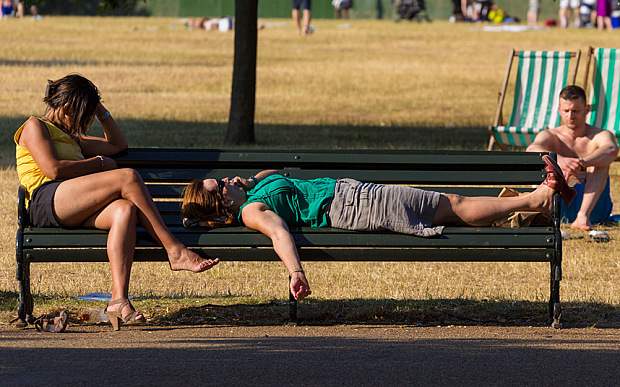
The scorching sun has brought British fashion out of its shell, with bizarre consequences, writes Alec Marsh
With the mercury pushing or even exceeding 40 degrees in offices across Britain this week, it’s likely that you’ll have noticed a few changes around the place. Head to the watercooler, or pop out for a coffee and what you discover is that you’ve entered a bizarre fashion parallel universe.
Where once there were suits or what passes for them, there are now men in flip-flops, shorts and T-shirts looking like they’re on their way to a frat party. Elsewhere there are now women in brightly printed cotton all-in-one romper-suits or microdresses – the sorts of things worn in the Med after a day baking by the pool. It’s all rather bizarre.
Pop out for a sandwich at lunchtime near our office in Holborn where we are and it’s like going to the beach, one dressed by Bluewater. One woman I saw yesterday was wearing a black over the shoulder belted dress, evidently inspired by gladiator-style design, and is the sort of thing you half expect to see at an Ibiza nightclub. It didn’t really make sense in central London, popping into the office.
But who can blame her? The heatwave is fundamentally discombobulating. As well as making people on public transport plainly listless or mad-dog aggressive, it’s also leading to some very peculiar fashion choices. But it’s not just the heat, because think about it a moment thinking and you realise that these choices reveal a fair amount about modern Britain. Britain’s response to heat wasn’t always to strip off.
One of my colleagues on Spear’s remarked that her father – in his nineties – hadn’t worn shorts since he was seven. That was about 1930 – so when Churchill was chancellor, Britain was still on the gold standard and Hitler was three years from power. Her implication was clear: heatwave or no, he would never concede to short trousers in public.
Come to think about it, I’ve only ever seen my father wear shorts to undertake sporting activity – and that was a wee while ago now. He doesn’t own a pair of jeans either – or certainly I’ve never seen him wear them. I also think he sleeps wearing a tie. He’s long retired now but I know there’s no way on earth that he’d have gone to work in a T-shirt and shorts.
It reminded me of that line about the Sopranos – in an episode when Tony Soprano hosts a barbecue for fellow gangsters he was wearing a pair of shorts. Feedback to the producers of the show from real-life gangsters was that while much of it was about right, this overstepped the mark: ‘A don does not wear shorts,’ they were told.
Just ten or 20 years ago the invasion of beachwear into the office it wouldn’t have happened either – the ruling would emanate from what would then have been called Personnel that men would be allowed to forgo their jackets and ties owing to exceptional hot weather. Female colleagues wouldn’t need telling, just as they don’t now.
But the sartorial world is changing fast, as you’ll have noticed. The Kardashians, celebrity culture, the predilection for externalising – evident in the millennial passion for tattoos, bodyhair and body art – is a fact of life and changing society before our very eyes.
The young princes don’t wear ties – and why should they? – except on formal encounters. These days when Prince Harry wears a V-neck you know it’s getting serious.
Yet watch a film from the Eighties or early Nineties, and you’ll be amazed to see men actually wearing suits or ties to go on dates. They also smoke in restaurants.
To see into the Gorgon heart of modern Britain, visit one of those television channels that did not exist more than five or so years ago. It’s likely to have the name of a real TV channel but be suffixed by a number, like ITV3 for instance. In these subterranean channels – which I regard as the dark web of telly – the proportion of what might be categorised ‘reality’ television to proper television is reversed so it’s nearly all entirely filled with shows about apparently real people cooking, romancing, socialising – if you don’t know what I’m talking about your other half probably does. In these outpourings of unremitting banality, you will see the clothing that you see today outside of the office in the sunshine. It’s the same paired down, casual, unbuttoned dress-code, and it reveals the unlayered fabric of a more exuberant, less socially and psychologically inhibited globalised society of which Britain is at the very vanguard. And in many ways therefore its a fundamentally wonderful thing to behold, even if it makes for some surprising dress choices in an office near you.
For me, 40 degrees or not, the furthest I’m prepared to go in the workplace is to switch the brogues for a pair of trusty Sebagos. I know. One step at a time.
Alec Marsh is editor of Spear’s
Related
‘The moment the car died for me’






